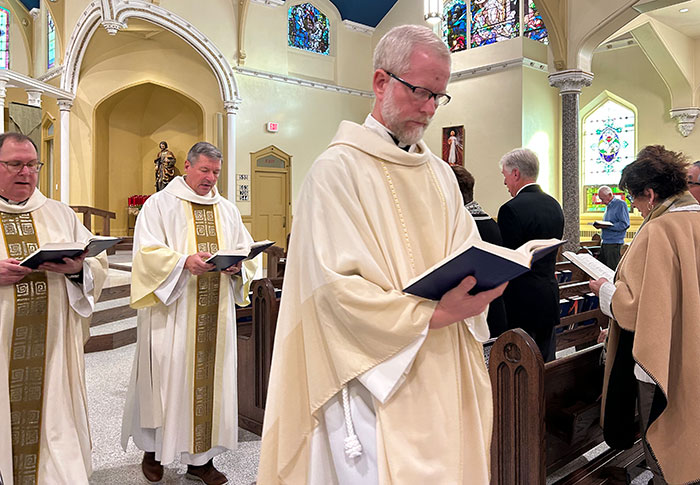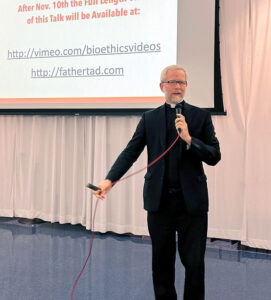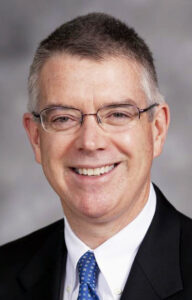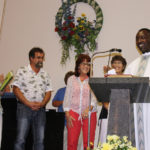
Father Tad Pacholczyk walks during the recessional of the White Mass for health care workers Oct. 21 at St. Paul the Apostle Church in Davenport. Father Bruce DeRammelaere, left, was the celebrant and Deacon Bob Shaw assisted.
By Barb Arland-Fye
The Catholic Messenger
DAVENPORT — Father Tad Pacholczyk, senior ethicist at the National Catholic Bioethics Center (NCBC), spoke to local Catholic healthcare professionals and others about the authentic core of human identity and the pastoral approach essential to accompanying persons who identify as transgender. An estimated 1.03% of U.S. adults (around 2.6 million) identify as transgender, according to the Household Pulse Survey (https://tinyurl.com/4nwekwy8).
His presentation Oct. 21 at St. Paul the Apostle Parish served to provide guidance to Catholics on the ethical issues that permeate the topic of transgender care. The talk followed a White Mass at St. Paul the Apostle Catholic Church for area healthcare professionals, organized by St. Thomas Aquinas Guild of the Quad Cities, a chartered guild of the Catholic Medical Association.
The work of the bioethics center is to make complicated issues in medical ethics and bioethics accessible to the general population. “A lot of this hits us where we are living our lives. It’s so critical to have the kind of tools and wisdom of holy Mother Church to direct our steps closer to our Lord Jesus,” Father Pacholczyk told his audience.
Laying the groundwork, he defined the terms gender identity and gender dysphoria. Gender identity refers to a person’s perception of being male or female. Gender dysphoria refers to the stress felt by someone whose gender identity differs from that individual’s biological sex. Gender dysphoria is a psychiatric diagnosis, he said.
“My central thesis would be, when it comes to the authentic core of our identity, we must stress the foundational ground of being human and being biologically sexed. There’s a foundational piece here we can never escape from,” Father Pacholczyk said.
Transgender challenges
Much of his presentation focused on males and females transitioning to the opposite sex through hormonal and surgical treatments and the harmful effects to physical, mental and spiritual wellbeing. He cited the ‘Catechism of the Catholic Church,” on Respect for Bodily Integrity, which states, “Except when performed for strictly therapeutic medical reasons, directly intended amputations, mutilations, and sterilizations performed on innocent persons are against the moral law” (No. 2297).
He showed short video clips to illustrate his points about the wellbeing of persons who identify as transgender and the ethical dilemmas raised. One featured Bruce Jenner, the Olympic athlete who transitioned to Caitlyn Jenner. Father Pacholczyk observed that Jenner seemed ambivalent about having transitioned. Another video featured flight attendant Kayleigh Scott, who transitioned from male to female and shared a positive story about the outcome in a 2020 United Airlines video. Three years later, Scott, 25, died by suicide.
One video clip followed an interviewer surveying students on a West Coast college campus who responded extemporaneously to questions regarding their acceptance of persons who identify as transgender. The questions ventured into the absurd, with the interviewer (a younger adult man) asking students how they would respond if he identified himself as a 7-year-old who wanted to enroll in a first-grade class.
Father Pacholczyk delved into the emotionally charged issue of school restrooms/locker rooms, stating his belief that students should use these “intimate facilities” based on their biological sex. He insisted on pronoun usage based on the biological sex of youths and adults and said mandates requiring employees to use people’s preferred pronouns in Catholic institutions, such as hospitals, violate conscience rights. Such a mandate would be incongruent with authentic Catholic identity, he said.

Father Tad Pacholczyk speaking in Denning Hall following the White Mass Oct. 21 at St. Paul the Apostle Parish in Davenport.
Accompany persons spiritually
He emphasized the core value of a physician’s vocation, which is to do no harm, and contrasted that commitment with performing surgical procedures involving “perfectly healthy genitalia.” Subsequent surgeries may be necessary because of problems stemming from the original surgery, he said. Hormonal treatment also has risks, and requires lifelong usage. He opined that the transitioning process is financially lucrative for those providing the services.
Father Pacholczyk shared the stories of two people he wrote about in his nationally syndicated column “Making Sense of Bioethics” who “de-transitioned,” one an older man and the other a young adult woman. Both regretted their decision to transition to the opposite sex. The young woman, Keira Bell, 23, sued the London clinic that provided her transition treatment and surgery. She won her case in 2020.
“Pastorally, what can we do as Catholics?” Father Pacholczyk asked his audience, as he concluded his presentation. He advised:
- Remember that God loves each person where he/she is and calls each to holiness.
- Welcome and accompany persons, spiritually.
- Foster full human development.
- Affirm the person, but not all their choices. “Charitably challenge false assumptions about truth and reality.”
During the Q&A, one attendee questioned the findings of a 2011 Swedish study that Father Pacholczyk referenced regarding the high suicide rates of people who are transgender. The ethicist stood by the findings. Dr. Tim Millea, a retired orthopedic surgeon who leads the St. Thomas Aquinas Guild, pointed out that secular medical journals ignore studies by Catholic researchers regarding the potential negative effects of hormonal and surgical procedures on people who are transgender. Lay people need to demand inclusion of such studies, he said.
Another attendee raised a question about the age at which children can make a decision about their sexual identity. “We don’t let children choose anything, especially teenagers,” Father Pacholczyk replied. He responded to a question about a trend toward more young women identifying as transgender, suggesting that no one factor is leading that trend although cultural pressure and social media influence it. The priest reiterated the need for compassion and accompaniment, and appropriate counseling.
The right thing to do

In a later interview with The Catholic Messenger, Dr. Millea noted that in the past about 75% of people who sought to change their gender identity were male while today the reverse is true, with more females seeking to change their gender identity.
He supported passage of two state laws this year pertaining to transgender issues. Senate File 482 prohibits “persons from entering single and multiple occupancy restrooms or changing areas and other facilities in elementary and secondary schools that do not correspond with the person’s biological sex.” Senate File 538 prohibits “activities regarding gender transition procedures relative to minors.”
“I honestly believe it’s the right thing to do,” Dr. Millea told the Messenger. He also appreciates the sensitivity of gender identity in people’s lives. “It’s deeply personal and intensely emotional,” he said. “It cuts to the core of what it means to be a person. What does it mean to be the person you were born to be?”
Dr. Millea also expressed appreciation for the Diocese of Davenport’s recently promulgated “Guidelines for Pastoral Accompaniment of Sexual and Gender Minorities” and its pastoral approach to this deeply sensitive topic. Even though the percentage of people who identify as transgender is small, it is challenging for them and their loved ones. “There are people in our community who are in that predicament. We should be offering them help that is based on evidence.”












To reduce breast cancer risk, prioritize a healthy lifestyle with regular physical activity and a diet rich in fruits and vegetables. Regular breast self-exams and mammograms for early detection are essential. Remember, prevention and awareness can make a significant difference in the fight against breast cancer.
“He opined that the transitioning process is financially lucrative for those providing the services.”
To assert is to state what one believes to be objectively true. To opine is to offer one’s opinion. This might seem pedantic, but the confusion, whether intentional or unintentional, of the subjective and the objective, is one of the mistakes that has allowed gender ideology to become what Pope Francis has called “one of the most dangerous ideological colonizations.”